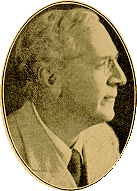Upton Sinclair

Upton Sinclair was a famous novelist and social crusader from California, who pioneered the kind of journalism known as "muckraking." His best-known novel was "The Jungle" which was an expose of the appalling and unsanitary conditions in the meat-packing industry. "The Jungle" was influential in obtaining passage of the Pure Food and Drug Act.
Sinclair's interests ranged over a wide variety of topics, in his many books and articles. He would receive a Pulitzer Prize for a later novel about Hitler's rise to power. His contemporary, the writer Edmund Wilson, would say of him: "Practically alone among the American writers of his generation, [Sinclair] put to the American public the fundamental questions raised by capitalism in such a way that they could not escape them."
The nomination of an avowed socialist to head the Democratic party ticket was more than the California establishment could tolerate. Sinclair's radical candidacy was opposed by just about every establishment force in California. The media virtually demonized Sinclair through a concerted propaganda campaign based largely on smears and falsehoods. Sinclair's candidacy also set off a bitter political battle both within the Democratic party and with many groups who were opposed to various aspects of the EPIC plan. Sinclair was denounced as a "Red" and "crackpot" and the Democratic establishment sought to derail his candidacy.
Despite all of this, Upton Sinclair was very nearly elected Governor of California in 1934. He probably would have won, except for two last-minute political errors in judgment. When President Roosevelt announced in June 1934 that he would propose a national social insurance system in the next session of Congress, Sinclair quite reasonably declared that he would be willing to defer his plan in favor of the President's national solution. This was perhaps reasonable, but it was impolitic, as it undermined his strongest issue. Then too, Sinclair felt duty-bound to announce his opposition to the rival Townsend Plan because the Townsend Plan was based on a regressive sales tax. Since the Townsend Plan and the EPIC supporters were often one and the same people, this was in effect an attack on his own core constituency.
When the votes were counted, Upton Sinclair got 37% of the vote, the Republican candidate got 48% and a third-party progressive candidate took another 13%. Had it been a two-man race, or had Sinclair been less intellectually honest and more of a politician, he would likely have become Governor of California and the EPIC pension plan might well have become the California model.
(In a classic exercise in political hubris, Sinclair detailed his EPIC plan in a book published in 1933, with the confident title "I, Governor of California And How I Ended Poverty: A True Story of the Future." Following the election he would publish another book with the humbled title "I, Candidate for Governor and How I Got Licked.")
Undeterred by his loss in the 1934 California election--and not really humbled either--in the 1936 election cycle Sinclair authored another version of his "I, Governor" booklet. This one had an even more expansive aim, and an inflated title to go along with it, "We, People of America and How We Ended Poverty: A True Story of the Future."
Copy of Upton Sinclair's 1934 EPIC Plan